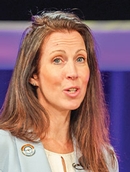
Gómez-Cintrón
In a series of rapid-fire talks, RSNA 2023 presenters covered critical topics running the gamut from the dangers of "colorblindness" in research to uncertainty quantification for AI to imaging Sherpa communities in the Himalayas.
Chosen with the help of social media voting, each speaker has five minutes to present their ideas on non-clinical topics.
Moderated by Ángel Gómez-Cintrón, MD, MPH, professor of radiology and orthopedic surgery at UT Health San Antonio, TX, Fast 5 featured topics selected to represent the meeting's theme, Leading Through Change.
Teaching Future Radiologists: What's In It For Me?
Kara Dorothea Gaetke-Udager, MD, an associate professor of musculoskeletal radiology at the University of Michigan, described the benefits—"What's in it for me?"—of teaching, not only for learners but also for educators.

Gaetke-Udager
"Teaching creates radiologists, and radiologists are in short supply these days," Dr. Gaetke-Udager said. "If you train them well, they will take outstanding care of your shared patients. And they can be your future fellow or colleague who crushes the lists with you someday."
While acknowledging that teaching is not easy, she made the case for myriad benefits, pointing out that teaching keeps the educator's skills sharp, and that trainees will challenge the status quo to bring creative new solutions.
MORE: Mentoring, Outreach, & Resources for Equity
Inspired by personal interactions with health professionals during her and her partner's concurrent pregnancies and deliveries, Anne Williams Darrow, MD, MA, outlined ways clinicians can better understand and serve LGBTQIA+ patients.

Darrow
Dr. Darrow, a diagnostic radiology resident at John H. Stroger Jr. Hospital of Cook County in Chicago, spearheaded the Mentoring, Outreach and Resources for Equity (MORE) program in Illinois. She explained ways to create a welcoming environment for transgender patients, and presented unique guidance for patients undergoing gender-affirming care.
"We can all make a difference and take the extra step to know the background of patients we are treating," she said. "If we try to use the right pronouns and create a welcoming environment, this can make a difference."
AI Needs to Know What It Doesn't Know
"As a community of radiologists dedicated to doing no harm and leading through change, it is our job to make AI as trustworthy as possible," said Cooper Gamble, BS, a first-year student at the University of Southern California who builds deep learning tools for radiology.

Gamble
On imaging, if the radiologist is unable to confirm a diagnosis based on the available information, we can distinguish information we know from what we do not. AI, however, cannot do this, he said. Uncertainty quantification can bridge between human intelligence and artificial intelligence.
"In radiology, we focus a lot on the wow factor. In this year of change, it's time we start thinking about the trust factor," Gamble said.
X-rays on Mount Everest
In the Himalayas, where many Sherpas earn a living by aiding Everest-aspiring tourists, bringing X-ray machines to the community can mean saving a life—but a false-positive result could mean a needless loss of livelihood. Saurabh Jha, MD, an associate professor of radiology at Penn Medicine, shared his experience as part of an outreach team who climbed the "Yak Road" to provide imaging services to Sherpa residents.

Jha
"The diagnostic dilemma, the consequences of the wrong diagnosis, is often that you have to conscript a helicopter service from Kathmandu that is used to rescue people from base camp," Dr. Jha said. "That journey itself is not innocuous. And therefore the value of information, the value of making the correct diagnosis, is immense. I've never been more proud to be a radiologist than when I was at 18,000 feet."
Is Colorblindness Doing More Harm Than Good in Combatting Racial Health Disparities?
Jessica Tsai Wen, MD, PhD, a diagnostic and interventional radiology resident at Stanford University in California, demonstrated how efforts to appear "colorblind" in scientific study populations have contributed to increased health care disparities by perpetuating notions that patients have genetic predispositions rooted in race.
Dr. Wen asserted that, although researchers should certainly try to achieve racially balanced cohorts in their studies, it's much more important that they simply report the racial
and ethnic breakdown of the cohorts.

Wen
"Please keep in mind that race is a social construct with no biological basis," Dr. Wen said. "And, therefore, it's important to consider the role of racism and systemic inequities, rather than race, in the discussion of observed health disparities."
Access Fast 5 presentations (T3-RC301) on demand at Meeting.RSNA.org

